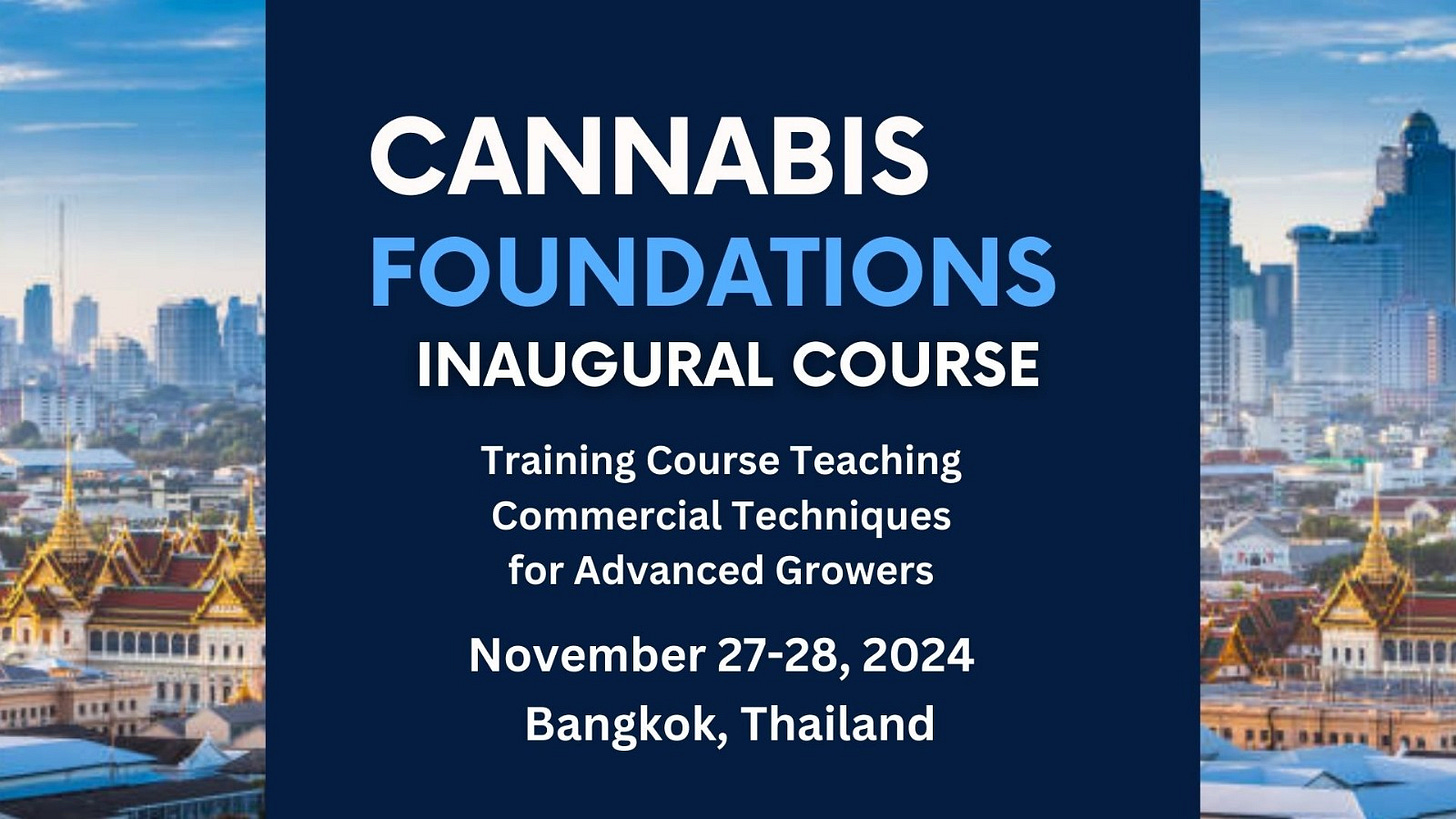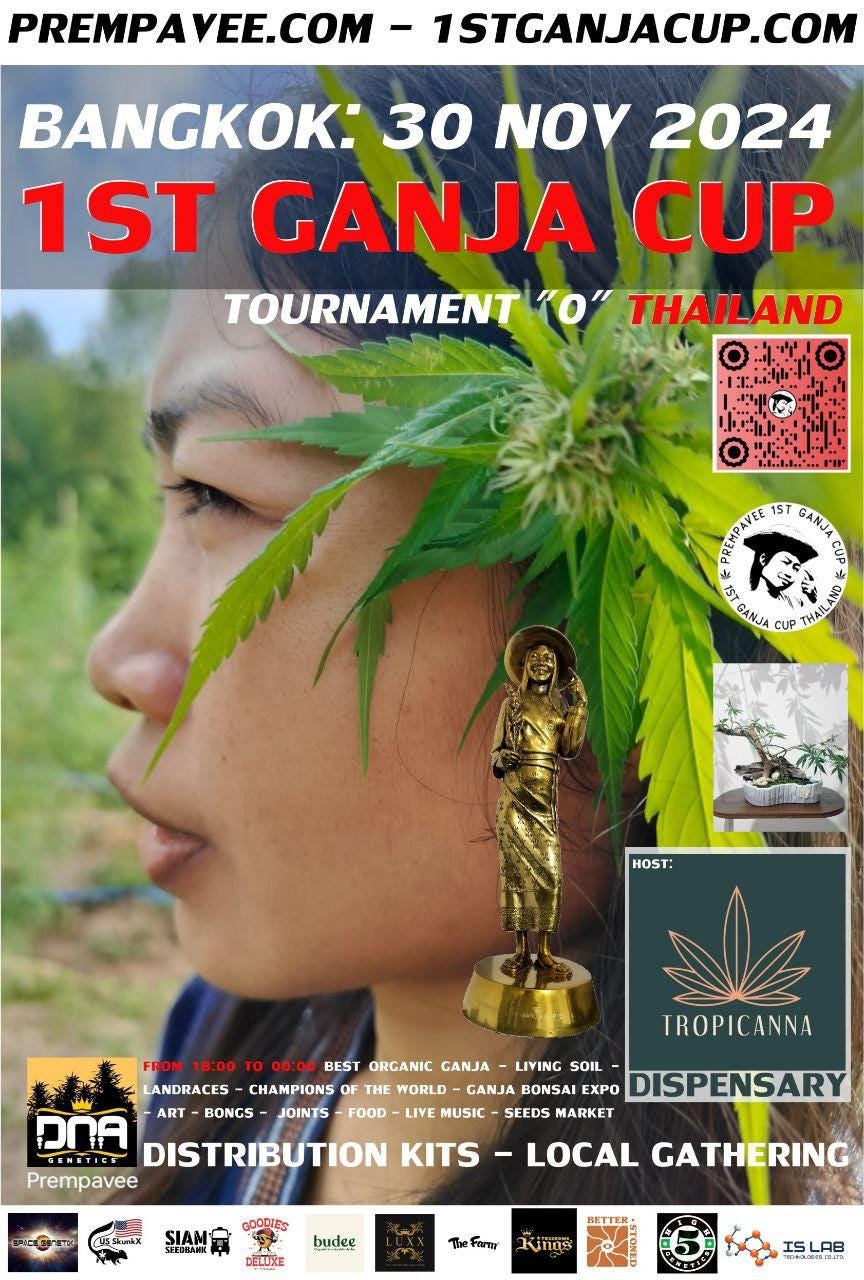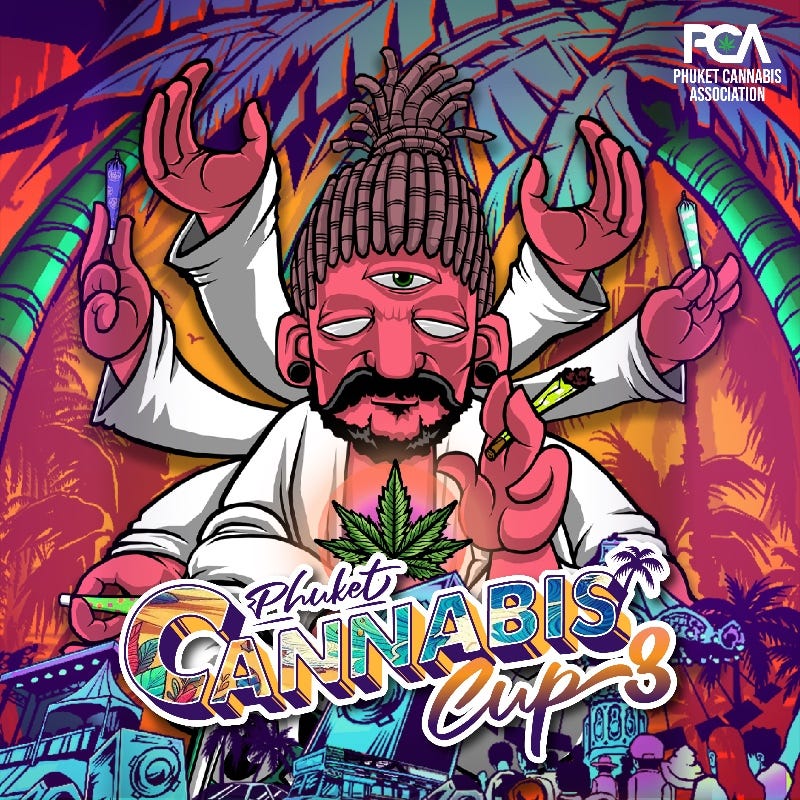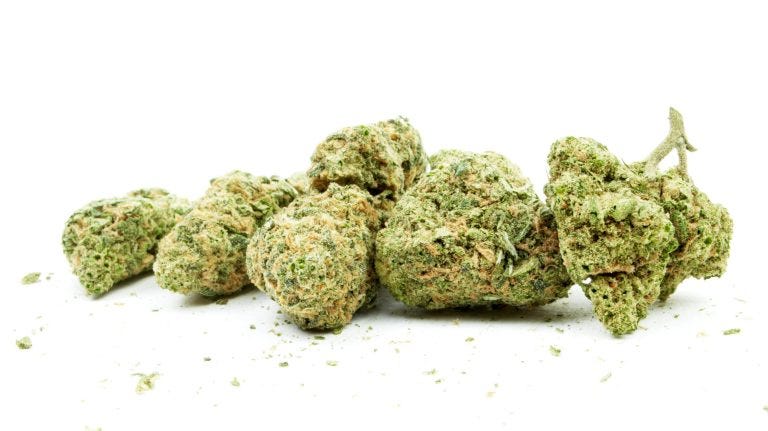In 2025, A Flood of The New For Cannabis In Thailand: Overview of Fresh Dangers & Promising Trends
The mandate to make all Thai cannabis medical will cause a cascade of disruptions in Asia’s only full-fledged cannabis marketplace. The time for fretting over regulations will soon be swept away.
Welcome! I'm Carl K Linn and this is my Thai Cannabis newsletter. If you've received it, then you either subscribed or someone forwarded it to you.
If you fit into the latter camp and want to subscribe, then you can click on this button:
The Thai Cannabis and Hemp Act will be approved in early 2025. Government spokespeople insist the day everything changes for cannabis in Thailand is January 1. I would not count on it.
The likelihood of delay is great. The chances that the Act will languish in Parliament as it has in the past are slim.
This is happening.
Finally.
After nearly 3 years, an unregulated and thriving new sector will receive its founding rules and regulations document.
EVENTS
Join Cannabis Foundations for an unforgettable experience at the Canna Foundations event, where cannabis enthusiasts and industry experts come together to explore the latest in cannabis education and innovation. This event promises engaging discussions, hands-on workshops, and networking opportunities that will deepen your understanding of cannabis cultivation, health benefits, and sustainability practices. Whether you're a seasoned grower or an intermediate, this is your chance to connect with like-minded individuals and expand your knowledge. Don’t miss out on this unique opportunity—
Sign up right here, right now!
This is the Cannabis Cup of the new rural force emerging from Northern Thailand. The sponsors are predominantly from the farmlands of the North and Northeast, where legal outdoor cultivation has developed at breakneck speed since 2022. Promises to be a unique experience.
Asia's International Cannabis Boutique Expo🎪
This exciting event will take place at the stunning
Venue: Beyond Patong Phuket
Date: January 11-12, 2025
Time: 3:00 PM to 10:00 PM both day 🕓 🚗Parking available.
The Phuket Cannabis Cup 3, is a celebration of cannabis culture, innovation, and community. Hosted by the Phuket Cannabis Association (PCA).
This year, they aim to elevate Thailand’s cannabis industry to an international stage by bringing together top cannabis communities from across Southeast Asia, including representatives from the Philippines and Indonesia. The event will feature renowned cannabis cup judges from North America and Europe, ensuring global recognition for the finest strains and products in the region.
Sign up right here, right now!
New Dangers For Consumers As The Fog of Unregulated Decriminalization Lifts In Early 2025
In early 2025, Thailand will be in its first high season with regulations in place. Cannabis will be available over-the-counter and considered medical. No prescriptions necessary. No cards. No laws against possession of any part of the natural cannabis plant, (for those 20 and above who are not pregnant or breastfeeding).
No worries? Not quite.
The wide-awake cannabis consumer can walk into any licensed dispensary and make a purchase decision among at least a dozen cultivars.
Diligent dispensaries have gotten out in front of the regulators and law enforcement; nevertheless, being aware of a few Do’s and Don’ts will help you avoid activity that could harm you economically, physically, or both.
Do watch out for corruption - both public and private - as new regulations could trigger law enforcement shakedowns and last-minute offloading of inferior, potentially contaminated weed by withering, undercapitalized dispensaries. A crack-down on shady suppliers could well trigger dumping of the non-medical (non-licensed, non-tested and often times dirty) dried flower.
Busts like this one will multiply as Thailand moves to discourage those left in the legacy cannabis market, putting pressure on those who are left to offload their illegal stash. Dont fall prey to their desperation.
Staying Out of Trouble
Don’t ignore the regulation that forbids possession of extracts with more than 0.2 percent THC; what has been an empty, toothless policy will be strictly illegal and enforceable.
Do stay away from extracts other than name-brand tinctures, gummies, capsules and topicals.
Don’t consume cannabis in any public space. Consider yourself warned.
Staying Healthy
Do insist on examining the dried cannabis flower before you make a purchase: Look, touch and smell. If your senses are pleased, and the flower is intact, inquire into its chemical compounds. Ask about percentages. One red flag will be that THC levels are reported to be extremely high, say over 27 percent. Another will be that compound percentages are taped willy-nilly on plastic containers.
What is known as “Deli storage” (cannabis in large glass jars sealed shut) is still common in Thailand, even when the herb inside is of high quality.
Don’t hesitate to ask questions. Is there a Certificate of analysis from the lab? Is there a summary of THC and CBD percentages? Are their other cannabinoids identified? Has the product’s terpene profile been identified? A connoisseur will often be able to identify the terpene profile by smell. Engage budtenders to discover whether they have the flower’s provenance ready at hand.
Don’t purchase unidentified dried cannabis flower, as it could be untested for heavy metals, and/or sprayed with dangerous pesticides or growth hormones, known as PGRs
Thailand’s legacy market is small, under-capitalized and inundated with low-quality cannabis from Laos that is trafficked in “bricks”; seeds and stems are compressed with dried flower that has often been sprayed with pesticides and other chemicals to accelerate growth or to mask mold and mildew. These bricks are then cut into shapes that resemble “popcorn dried flowers”: It’s a hoax.
Do understand the difference between the legacy market in Thailand and those in wealthy countries. Illegal markets from Canada to Illinois are fierce competitors with the legal markets because they often offer a higher quality - even cleaner - product at lower cost.
Not so in Thailand.
Here, small-time Laoation hoodlums dominate the illicit market. They traffic inferior product across rivers to waiting broken down pickups driven by teenagers with worn-out flip-flops. That is, the neo-propaganda currently pumped out by certain institutions in the US and Canada - with the admonition to “beware of the untold dangers of the legacy market” - while misrepresenting the dangers in the marketplace of the wealthy countries, applies accurately to the emerging market in Thailand.
The acronym for the unhealthy chemicals used to boost cannabis growth is PGR, which stands for Plant Growth Regulators.
These are synthetic chemicals that are applied to cannabis plants to alter their growth patterns. The goal is to increase yield and to enhance certain characteristics of the buds.
The Possible Invasion of Cannabis With Plant Growth Regulators
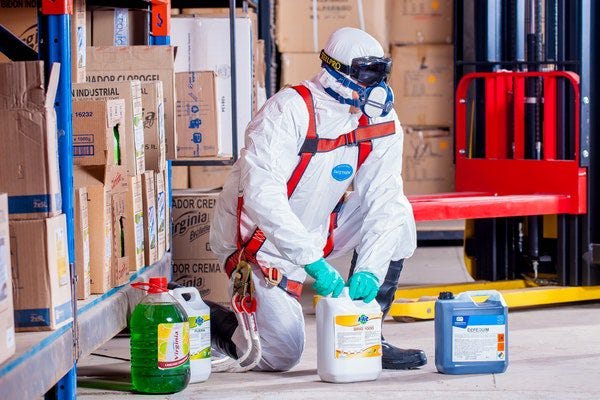
Definition: PGRs are substances that influence the growth processes of plants. In cannabis cultivation, they are used to promote larger and denser buds, but they can also have negative health implications.
Common Types of PGRs:
Chlormequat Chloride: Used to increase bud size while inhibiting other growth areas.
Daminozide (Alar): Classified as a probable carcinogen and can limit the development of beneficial cannabinoids and terpenes.
Paclobutrazol: Known for its toxicity; it can break down into harmful compounds when smoked, posing serious health risks.
Health Risks: Cannabis grown with PGRs may contain harmful residues that can lead to adverse health effects, including skin irritation, organ damage, and potential carcinogenic effects.
Consumer Awareness: Consumers need to be aware of PGRs in cannabis products, especially as they can compromise the quality and safety of the product.
Regulatory Status: Many of these chemicals would be banned from use on Thai medical cannabis due to their toxicity, raising concerns about their legality and safety. Sadly, no timeline or concrete action plan is coming from the public sector at this point. The solution will have to come from the marketplace itself.
Consumer-driven monitoring systems are crucial for ensuring safety and product integrity as PGRs represent a significant concern at the starting line for legal, regulated cannabis in Thailand.
Beware the rock-hard, odorless PGR chem-weed.
The 6 characteristics of Cannabis with PGRs
1. Excessive Red or Brown Hairs:
2 Lack of Crystals
3. Minimal Aroma
4, Spongy or Wet Texture
5. Rounded Appearance
6. Dense, heavy buds
Learn more here: Comprehensive Guide to PGRs
Thai Market Innovation: Community Building With Tech
Currently, there are several peer-reviewed platforms under development in Thailand to provide solutions to consumers. These are sites, portals and Apps whose aim is to encourage reviews of dispensaries that together constitute a consumer info clearinghouse of dispensaries across the country. The solutions they propose are promising. Some anticipate launching by January 2025. They cannot come soon enough.
One such platform on the last leg of its roadmap to market is Cannbox Thailand. CEO Cenk Cetin said, “We anticipate launching our new App by the end of December 2024.” Already making news as the first nationwide delivery service from curated, licensed dispensaries, Cannabox’s latest project adds a community review portal to rate and review dispensaries and their products. The App includes extensive video capabilities to aid in the reviewer’s description an analysis.
Your intrepid reporter will examine each as they come online.
Don’t disregard dried flower grown outdoors simply because it lacks the aesthetics of the craft flower grown in high-tech, windowless indoor cultivation centers.
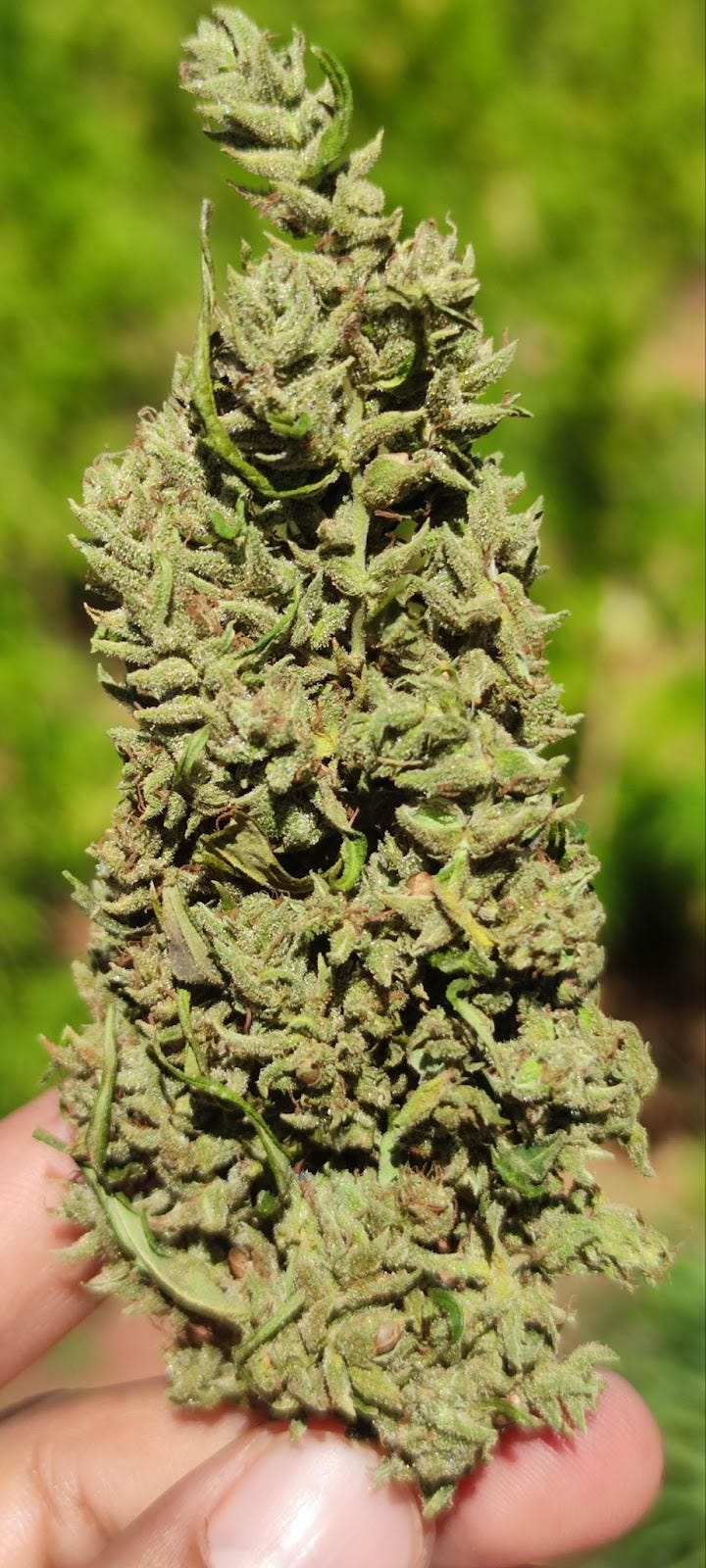
Indoor cannabis is grown under high standards, and indoor cannabis is treated with unhealthy growth chemicals; outdoor cannabis is grown according to high standards, but can also use unhealthy chemicals in outdoor cannabis cultivation.
Outdoor Grows, Home Grows, Ancient Landraces and The Efficacy of Cannabis in Thai Traditional Medicine
Much like the role of Thai traditional medicine in normalizing cannabis in Thailand, outdoor cultivation has been eclipsed by the irrational, if understandable, enthusiasm for over-the-counter cannabis in the vast array of dispensaries that emerged so quickly after decriminalization in June of 2022.
After all, Thai cannabis is the only marketplace of its kind on one half of the globe.
As cannabis in Thailand advances this coming year, the culture that surrounds it will expand into its past, to re-imagine and re-invent the Thai traditions of growing cannabis organically in the equatorial sun and the shade of mountains in the North and the herbal concoctions that have featured cannabis as the primary medicinal aid for over a thousand years.
2025 will see an equilibrium between the pull of high-tech cultivation and genetic specialization and the lure of cultivating traditional landraces at home by novices and experts alike and on farms owned and operated by farmers.
Thailand Is Poised To Lead Into The Future: Will The Sector Show The World How To Sustain A Profitable Legal Cannabis Marketplace?
As Thai cannabis pivots from permissionless innovation in a regulatory abyss to rule-following in a progressive legalization regime, it could provide global leadership by creating and sustaining a profitable legal marketplace of reliable, medical-grade over-the-counter cannabis.
It would mean developing an approach that deals with the excesses of cannabis use with honesty, maturity and transparency - one that focuses not on threats of punishment of consumers for getting into the wrong line, so to speak, but rather by actively shunning so-called recreational use while extolling the virtues of its medicinal qualities.
Thailand has 2 big advantages over the legal cannabis markets of the West
the absence of a sophisticated legacy market and
the absence of exceptionally high cannabis taxes.
Now that Thailand has walked through the ring of fire - and cannabis is delisted and medical use encouraged - its time to learn from the West's mistakes.
Thailand should
1. Make all non-medical cannabis a violation on the producer’s part and
2. Define all medical weed by that which meets a specific range of high-quality standards.
Such a regulation would lead to medical eating recreational: Thailand could gradually dissolve this mind-numbing trap from which cannabis in the West seems unable to escape. Such a move is entirely realistic within the framework of the coming Cannabis Act.
Thai Cannabis Act ought to simply stipulate that
1 all legal weed and cannabis products in Thailand are medical and
2 qualification in the medical category requires the passing of clear and distinct rigorous tests.
Then the black market is where you find all the inferior, untested cannabis.
Meanwhile, there is still no special tax on cannabis in Thailand. Hence the product that fails on quality is in violation, while the legal sector continues to improve its quality and has latitude to test pricing strategies.
Without crippling taxes (or absurd banking bans) companies will have the discretionary income to make testing legitimate again - and transparent.
Freed from this cumbersome legalistic and mainly false dichotomy, Thailand can reach into its 1200-year history of Thai traditional medicine and pursue research that uncovers the tradition’s ancient wisdom that revolves around the Buddhist medical proposition that all disease begins with stress and sub-optimal inputs that individuals introduce to their system with wrong-headed consumption habits.
Recreational use would gradually be reduced to a kind of drug abuse facilitated by producers’ failure to abide by quality standards.
Individuals can overdo it even with high-quality cannabis. But we need to ask, is innocuous stupidity better dealt with by shaming and finger-wagging, or by upending a young person’s life with incarceration and branding him or her a convict for life. The latest version of the Thai Cannabis and Hemp Act says the former is preferable. Who are we to disagree?
In the end, delisting cannabis and excluding casual users from punishment means the recreational vs medical binary collapses into childishness vs conscious consumption.
Add to this an understanding that a special tax on agricultural biomass, with no justification other than the fact it has been prohibited, is counter-productive in its creation of incentives to seek out illegal sources. You end up with a recipe for avoiding the self-inflicted cannabis recession that only seems to be getting worse in the West.
I say Godspeed Thailand; may you move ever forward in your progressive and enlightened adventure into the past.





